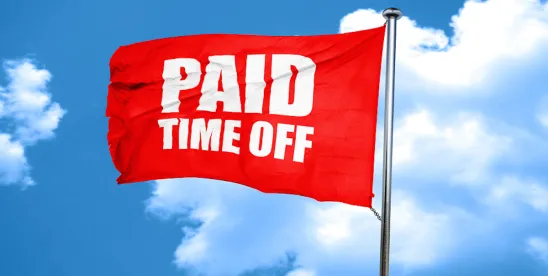New laws require Illinois and Cook County employers to provide employees with paid leave that can be used for any reason, while a new Chicago law, effective July 1, 2024, requires Chicago employers to provide both paid leave that can be used for any reason and paid sick leave.
Transcript
Welcome to Jackson Lewis’ podcast, We get work™. Focused solely on workplace issues, it is our job to help employers develop proactive strategies, strong policies, and business-oriented solutions to cultivate an engaged, stable, and inclusive workforce. Our podcast identifies issues that influence and impact the workplace and its continuing evolution and helps answer the question on every employer’s mind. How will my business be impacted?
New laws require the state of Illinois and Cook County employers to provide employees with paid leave that can be used for any reason. While a new Chicago law effective July 1st, 2024 requires Chicago employers to provide both paid leave that could be used for any reason and paid sick leave. On this episode of We get work™, we discuss the Illinois Paid Leave for All Workers Act, the Cook County Paid Leave Ordinance, and the City of Chicago’s new paid leave and paid sick and safe leave ordinance, what employers need to know, and how they can ensure compliance with all these new regulations.
Our hosts today are Alison Crane and Sarah Gasperini, leaders of the paid leave task force, principals in the Chicago office of Jackson Lewis, and members of the firm’s Disability, Leave and Health Management group. Alison and Sarah assist employers with navigating state and local leave laws and provide legal advice on individual leave and accommodations issues. Alison and Sarah, the question on everyone’s mind today is, what are the paid leave entitlements in the state of Illinois, Cook County, and Chicago, and how will those impact my business?
Thank you, Alitia. I’m Alison, and thank you, Sarah, for being here with me today. Sarah and I would like to welcome you all to Illinois Paid Leave Palooza.
Paid leave is a topic that has been near and dear to both our hearts since the first paid sick leave ordinances were enacted back in 2017. Things were fairly settled for a while, but as many of you have been following, there has been significant recent activity in the Illinois paid leave space. Today, we will briefly discuss the three major paid leave laws for Illinois employers to be thinking about, as well as some common questions we have been receiving from employers.
Sarah, would you like to start us off with a brief overview of the Illinois Paid Leave for All Workers Act, or as we like to call it PLAWA?
Sure, Alison. PLAWA became effective on January 1st, 2024, and it allows employees to earn up to 40 hours of paid leave that can be used for any reason of their choosing.
Sarah, does this mean I could use PLAWA leave to doom scroll social media if I wake up on a Friday morning and I’m just not feeling like going to work?
It sure does, Alison. Plawa leave can be used for any reason of the employees choosing, and employers are not allowed to ask the reason for use. Under PLAWA, employees accrue one hour of paid leave for every 40 hours of work. Employers are permitted to cap accrued leave at 40 hours annually, or they have the option of frontloading the leave annually in lieu of an accrual system. Under the Act, up to 40 hours of accrued, unused paid leave will carry over annually. But employers that frontload paid leave may require employees to forfeit all unused paid leave at the end of a 12-month benefit period. Employers may also limit employees to using no more than 40 hours of paid leave in the 12-month benefit period.
Alison, would you like to provide a brief overview of the Cook County paid leave ordinance?
Sure, Sarah. The Cook County paid leave ordinance went into effect on December 31, 2023. The Cook County ordinance is very similar to the PLAWA. Like PLAWA leave, Cook County leave can be used for any reason of an employee’s choosing, and employers are also not allowed to ask the reason for use.
Alison, are you saying I could wake up and decide to use my Cook County paid leave to jet off to Europe and see Taylor Swift?
Sure, Sarah. If you are a covered employee and you have accrued time available, you can book that ticket. As with the PLAWA, under the Cook County ordinance, employees accrue one hour of paid leave for every 40 hours of work. Again, employers are permitted to cap accrued leave at 40 hours annually, and employers have the option of frontloading the leave in lieu of an accrual system. As many of you will remember, Cook County enacted a paid sick leave ordinance back in 2017, and this new ordinance replaces that Cook County paid sick leave ordinance by now providing leave that can be used for any reason of an employee’s choosing.
Sarah, it seems to me that Chicago would not allow itself to be outdone by the state of Illinois or Cook County. Would you like to round out our discussion with a brief overview of the Chicago paid leave and paid sick and safe leave ordinance which becomes effective on July 1st?
Sure, Alison. I know you and I have both been absolutely flooded with questions about this new Chicago ordinance, and July 1st is around the corner. And I agree, Chicago will not let itself be outdone. Under the new Chicago ordinance, employees will accrue one hour of paid leave for any reason and one hour of paid sick leave for every 35 hours worked. So that’s two hours of paid time off for every 35 worked.
If an employer provides paid leave under an accrual method, employees will be allowed to carry over up to 16 hours of paid leave for any reason and up to 80 hours of paid sick leave from one 12-month benefit period to the next. Employers can frontload 40 hours of paid leave and 40 hours of paid sick leave on the first day of employment or the first day of the 12-month period as an alternative. If paid leave is frontloaded, no carryover is required by the ordinance, but up to 80 hours of unused sick leave must still be carried over.
Thanks, Sarah. And for our listeners, we’d like to remind you that each of these three leave laws has its own separate set of rules and regulations. It took a little while for the various enforcing bodies to finalize the rules and regulations, but it appears we are there now and do have final versions available.
Sarah, I know we have both been asked a lot of questions since these paid leave entitlements were first announced last fall. One of the most common questions I’ve been receiving focuses on existing policies. For example, if a company has a generous existing PTO policy, is it required to change its policy?
Alison, I’ve been getting the same question. How are you answering it?
Well, Sarah, as with all good lawyerly answers, I’ve been telling employers that it depends. Some PTO policies that were in effect before the start of 2024 may be grandfathered in under the PLAWA and Cook County ordinances if they meet certain minimum requirements.
Very true, Alison. But what about the Chicago ordinance? Does it have a grandfathering type provision?
Well, Sarah, technically Chicago’s ordinance would allow employers to use a pre-existing PTO policy. But in practice, I have yet to see an employer’s pre-existing PTO policy that is actually firing on all of the required cylinders that would be needed to fully comply with the Chicago ordinance. And there may be good reasons why employers would not want to use their PTO policies for compliance with the Chicago ordinance in light of its very detailed requirements. This is definitely something that requires careful thought.
Sarah, I’m curious. What other common questions are you receiving?
Another question that I have received multiple times is, can I impose restrictions on when my employees use the time? And I’ve been telling clients, yes. In certain cases, employers can adopt a reasonable policy that outlines the reasons that they can deny paid leave requests due to operational necessities and business needs.
But Sarah, what does that really mean? Are you now saying I won’t be able to stay in bed and doom scroll?
Well, for example, let’s say you worked at an accounting firm and the accounting firm’s busy season was from about April 1st to April 16th, right around tax day. The accounting firm could state in its policies that leave requests will be limited during that specific busy period as a result of staffing needs.
Yep, that makes sense to me. I guess there may be some days where I won’t be able to stay in bed after all. Another question I’ve been receiving is, if I’m headquartered in Chicago, do I need to worry about the Cook County Ordinance or the PLAWA? I’ve been telling employers that this inquiry is generally determined by where the employee works. For example, employees who consistently work in Chicago will generally be covered by the new Chicago Ordinance beginning on July 1st. If an employer has employees who work remotely from other locations, they could be covered by the PLAWA and or Cook County Ordinance.
Gosh, Sarah, this is a lot of information for employers to digest. Should we end with a few practical takeaways for our listeners?
Yes, great idea, Alison. So I would say make sure to know which laws apply to your workforce and make sure that you’re complying with them. You’ll also want to comply with all applicable notice posting and record keeping requirements. And as a reminder, your deadline for distribution of the city of Chicago’s required notice is coming up. You should plan to distribute that notice with a paycheck issued in July.
Absolutely, Sarah. I would also add that it is a great time to reach out to your favorite Jackson Lewis employment lawyer with questions and to conduct final policy reviews now that the interpretive rules and regulations for all three laws are available to us.
Well, this was a really fun discussion. I always enjoy tackling paid leave issues with you, Sarah. I appreciate your insights and thank you for joining me today.
My pleasure, Alison. I’m always up for a paid leave palooza.
Thank you for joining us on We get work™. Please tune into our next program where we will continue to tell you not only what’s legal, but what is effective. We get work™ is available to stream and subscribe on Apple Podcasts, Libsyn, SoundCloud, Spotify, and YouTube.





 />i
/>i

